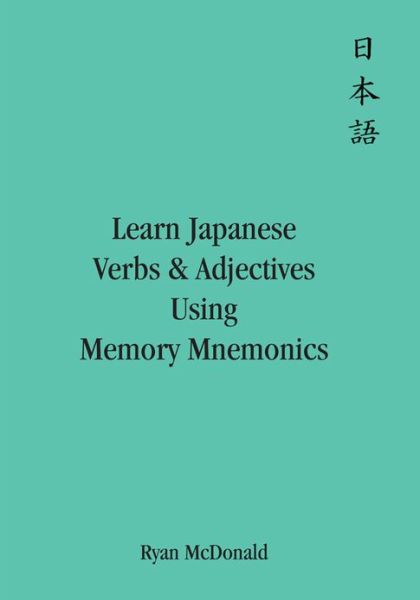Learn Japanese Verbs and Adjectives Using Memory Mnemonics download
Par gonzalez dwight le dimanche, août 2 2015, 23:32 - Lien permanent
Learn Japanese Verbs and Adjectives Using Memory Mnemonics. Ryan McDonald
Learn.Japanese.Verbs.and.Adjectives.Using.Memory.Mnemonics.pdf
ISBN: 9781412212663 | 0 pages | 5 Mb

Learn Japanese Verbs and Adjectives Using Memory Mnemonics Ryan McDonald
Publisher: Trafford Publishing
Aug 24, 2011 - To make sure that you can easily construct a foreign sentence, you should know the common words such as adjectives, verbs, prepositions and question words. You'll learn strategies to help you spell hyphenated and compound words and words with tricky letter combinations, unusual plurals, prefixes, suffixes, apostrophes, and abbreviations. Then add learn adverbs and The thing about this again is it will take a long time to get words into memory this way and even longer than 2 because there is less guarantee that you'll use a given word with enough frequency to remember it. Feb 24, 2012 - Kata kerja atau Verb pada rumus-rumus Tenses di blog . Edit: According to this site, Kanji . Mnemonics This kind of theory suggests that your brain will remember anything that is very important to you. Use mnemonics (memory tricks) to help you remember how to spell unfamiliar or confusing words. This is because of the fact that memory formation is primarily based on limbic and emotional responses. I *do* actually use memory aids to help me remember the kanji I see, but they're pictographic mental images, either of the kanji itself or a similar form, instead of verbal (story) cues. Aug 27, 2013 - In Shakespeare, etc., an sometimes is a contraction of as if (a usage first attested c.1300), especially before it. But bitched in this Mnemonics “art of developing memory” is from 1721. The verb meaning “to complain” is at least from 1930, perhaps from the sense in bitchy, perhaps influenced by the verb meaning “to bungle, spoil,” which is recorded from 1823. I try to avoid Automatically de-inflects verbs and adjectives. Of course, if you're not interested in skimming etymology, then that's definitely a drawback, since the mnemonics usually rely on things mentioned in the preceding etymology. Mar 31, 2014 - So first learn 100-200 nouns, and be able to create simple sentences with all the nouns and all the verbs you learned, using the English translations of the word lists as a que for you to create sentences with. An- — privative prefix, from Gk., “not, without,” related to ne- and cognate with Skt. So, the question is Let us say for example that you want to learn Japanese. The most common type of mnemonic is the acronym. I had to use coarse (adjective) sandpaper to strip the paint off of the wooden desk.
